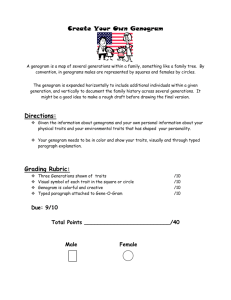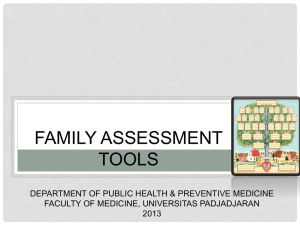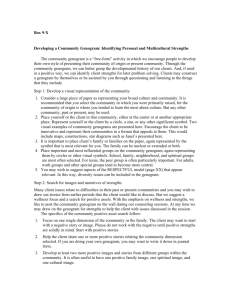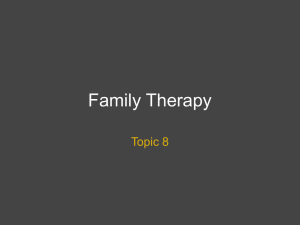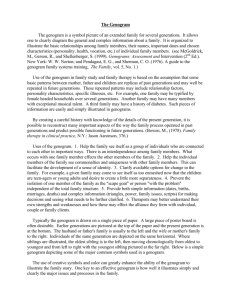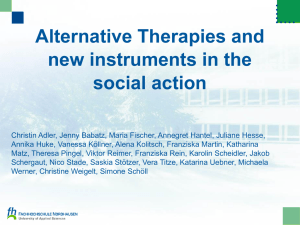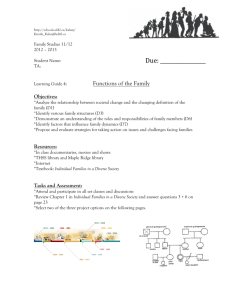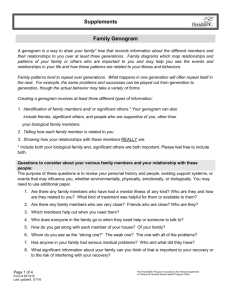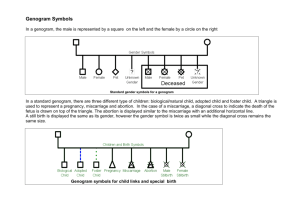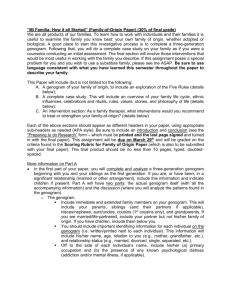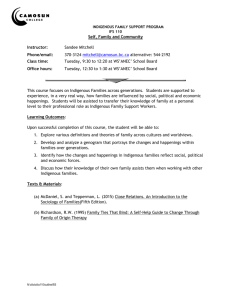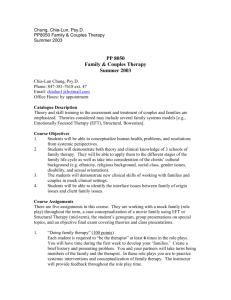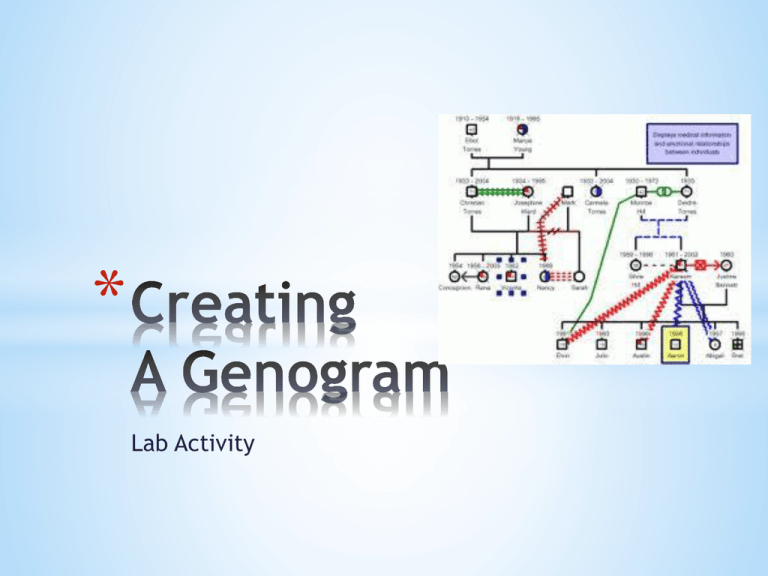
*
Lab Activity
* General learning objective
Upon completing this session, the student should be able to
create a genogram of patient and family
* Specific learning objective
* Explain the function of genogram
* Describe the steps in creating a genogram
* Interpret a given genogram
* Given a case, create a genogram
*
*
Task: Please interpret this genogram!
Gogon’s Family
As of November 1, 2011
D= 2000 Jecko 72
Memet 65
xxx
Seni, 45
Jenny 65
Gogon, 43
1995
Raffi, 13
Nunik, 40
Yuni, 10
Red line: living
together on week
days
Green line: living
together on
weekends
*
* Genogram
The genogram is a
biopsychosocial family tree.
It records the family in its life
cycle, family illnesses and
relationships.
*
Function of genogram
The uses of genogram are threefold:
* as a quick overview of the interrelationships
between family members
* as a way of looking at the family medical and
psychosocial problems
* as a tool for understanding the
multigenerational family systems
*
*
Standardized Symbols used in Family Genograms
male
female
d
date of divorce
D
Date of death
abortion or miscarriage
Sex not specified
Deceased/death
A
Adopted female
b
date of birth
m
date of marriage
Induced abortion
Pregnancy-child in utero
Dizygotic twins
Monozygotic Twins
*
Standardized Symbols used in Family Genograms
Close relationship
1989
married and year
Family living together
1990
1992
Separation and
year
Divorce and year
1989
Unmarried
relationship
Conflictual relationship
Distance relationship
1989
1992
*
Standardized Symbols used in Family Genograms
Symbols of diseases or situation
Obesity
♥
♥
Allergy
xxx
xxx
Alcoholism
Heart disease
Stroke
Depression
Asthma
War Casualty
Hypertension
ALC Alcoholic
GI
GI tract disease
ALL Allergy
HT
Hypertension
ART Arthritis
H
MI
Myocard Infarction
MV
P
PU
D
SL
E
Mitral Valve
Prolapse
TB
Tuberculosis
CAD Coronary Artery
Disease
CVA
Cerebrovascular
Accident
CA Cancer
DEP Depression
DM
Diabetes mellitus
Peptic Ulcer
Disease
Systemic Lupus
Erythematosis
*Commonly used
Abbreviations
*GENOGRAM
1.
2.
3.
4.
5.
6.
7.
8.
COMPONENTS
Symbols
Three or more
Bakri, as of 8 April 2010
generations
The name of family
A listing of the first born
of each family to the left,
with siblings listed
sequentially to the right
1969
Ardi,68
I
1970
The names of all family
member
Age or year of birth of all
family members
II
Any deaths, incl. age of
death and cause
Dates of marriages and
III
divorces
Nia,64
*GENOGRAM
COMPONENTS
Bakri, as of 8 April 2010
9. Significant diseases or
problems of family
1969
members
I
10. Indication of members
living together in the
same household
II
11. A key depicting all
symbols used
12. Symbols selected for
III
simplicity and
maximum visibility
Ardi,68
1970
Nia,64
Interpretation:
From the life cycle perspective….
From type of family…
From the psychodynamic….
The risk factors……..
*
*
*
Bobby’s Family
As of October 9, 2011
M= 1972
Susilo , 67
Ani, 54
D= 2004,
Female
cancer
xxx
Bobby, 37
Ina, 12
Ratna, 36 Andre, 35 Lusi, 33,
Fibroadenoma
mammae
Ima, 5
Widodo, 25
*
Case 3.1
* Alice is a 36-year-old single woman was
diagnosed with eczema. Her brother, 25 years
old had asthma. She has one big brother and 2
youngest sisters. No other family members
have had asthma. Her father died at age 61
years old and her mother is post acute
myocardial infarction patient. In a maternal
aunt, breast cancer developed.
Case 3.2
* Mrs. Marni, is a 34-year-old woman was diagnosed with
headache and injury in her shoulder. Her husband and
3 children (boy (12), and twin girls (5)) also are seen
at the clinic. Two of children (boy and one of the twin)
have been diagnosed as attention-deficit/
hyperactivity disorder (ADHD). Her husband has been
treated for depression and high blood pressure.
Further questioning
* Her father had hypertension and her mother had
migraine. Both are still alive.
* She lives with her husband and her children. She has
conflict with her husband and experienced domestic
violence.
* She is worry about her son because he is always
rebelling to his father and influencing her sisters to do
so.
* Case 3.3
Jojon is a 44-year-old man was diagnosed with
chronic obstructive lung disease. His parents are
living and both have type 2 diabetes. He has two
siblings, both older brothers. One of his brothers
died because of traffic accident. His wife died
because of alcohol intoxication. He had overt
close relationship with his wife. They have no
children. He is living alone in his house.

